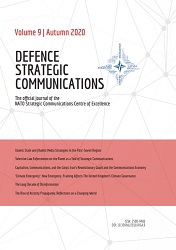‘CLIMATE EMERGENCY’: HOW EMERGENCY FRAMING AFFECTS THE UNITED KINGDOM’S CLIMATE GOVERNANCE
‘CLIMATE EMERGENCY’: HOW EMERGENCY FRAMING AFFECTS THE UNITED KINGDOM’S CLIMATE GOVERNANCE
Author(s): Quentin WightSubject(s): Governance, Environmental and Energy policy, Politics and communication, Theory of Communication
Published by: NATO Strategic Communications Centre of Excellence
Keywords: strategic communications; strategic communication; framing; frame analysis; climate governance; climate change communications; climate emergency;
Summary/Abstract: This article addresses the relationship between how discourses are framed, how they influence processes of change and stability, and how liberal democracies—here, the UK—govern the risks posed by climate change. It analyses divergent ways in which ‘emergency framing’ is employed in the UK’s climate governance field—a contested, multi-actor field where strategic communications works to influence processes of goal setting, policy making, standard setting, and implementation. The article inquires who is and who is not using emergency frames at varying levels of intensity, and why. It concludes that ‘incumbent’ actors are more inclined to reject the emergency frame; they tend to employ implicit ‘techniques of emergency’ only when in support of adaptation and resilience measures. Conversely, explicit emergency framing is the defining discursive characteristic of disempowered ‘challengers’, who employ it confrontationally in their fight to reduce greenhouse gas emissions.
Journal: Defence Strategic Communications
- Issue Year: 9/2020
- Issue No: 9
- Page Range: 121-167
- Page Count: 47
- Language: English

